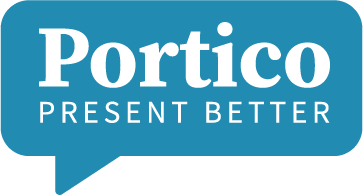This is one of the most frequent questions we get, and it’s a problem that is driven by an information imbalance. One person – perhaps you as the presenter – knows far more detail about the topic than your audience. This makes it hard to know where to start, or how much detail to go into either in the presentation itself or in Q&A.
The information imbalance is compounded given that most technical experts have spent the better part of their careers in a lab, perhaps working with algorithms, or engineering software. They haven’t been grooming their communication skills all these years because that’s not how their work has been evaluated. Until now.
Here are a few approaches that will help you connect your technical concepts to your audience, whether you have less than an hour to prepare, or if you’ve got a few days or weeks to get ready.
If your presentation is within the next few hours:
Remove the secret language. Jargon is defined as special words or expressions that are used by a particular profession or group and are difficult for others to understand. We rely on jargon when we feel as if the current pool of available words and combinations aren’t enough to properly grasp what we’re working on or towards. In the moment, the new words or fancy word combination feel special:
“Ideate! Innovation! Paradigm!”
In reality, few people share the same definition of what the word or phrase means. Imagine the confusion once we take our presentation to other teams at work, or externally?
We might cringe when we hear others rely on jargon, but the implications are more than an annoyance. As experts in simplification Alan Siegel and Irene Etzkorn explain in Simple: Conquering the Crisis of Complexity, “The use of jargon is a prime example of a lack of empathy – when you fail to consider the frame of reference in which your message will be received.”
If the purpose of presenting is to bring more people into your idea, there’s no easier way to get off on a wrong foot than to speak in another language.
Scan your notes and slides for any words that wouldn’t come up in everyday conversation. Decide whether you should define them or replace them with plain English.
Along the same lines, our Washington, D.C. based clients in particular have to carefully review their “alphabet soup” of acronyms that are so prevalently used in the federal space.
If your technical presentation to non-techies is tomorrow or later:
Start with an explanation of the value. As you think of the main points you’d like to make, pause and provide a broader explanation as to why your messages are important.
How does the research contribute to the field of knowledge? What problem will this technology help solve?
Resist the temptation to lead with how technology works, an explanation of the methodology, or listing the features and functionality.
Once your non-technical audience understands the problem you’re solving, and ideally how they or something they care about will benefit, you’ll have earned the next phase of the discussion: your methodology or the technology you’ve worked so hard on. This is the part you probably wanted to start with, because you know that the “how” of your methodology is what makes it different, and what makes it work.
To find a way to communicate your technical methodology, find a shared reference point for the different types of people that you communicate with about your work. Start with your friends, move on to family members of different ages. For many of us, our own families and closest friends have no real idea what it is that we do in our professional lives outside of a title or general category. Ask them what it is that they think you do, and then give them a clearer picture by asking questions and continuing to clarify and connect to a shared reference point.
Hint: To find that reference point scan headlines. What news events can you tie your work to?
Evaluate your idea. For candid feedback, test your messages with a teenager. (If you don’t have one in your extended family, try asking an adult before they’ve had their first cup of coffee). It will probably take a few warm-up questions to find out what their familiarity with the topic is, and quickly they will communicate – nonverbally if not verbally – whether this technical topic holds any interest or relevance for them. Enjoy the scramble to find words and explanations that will help you elevate your idea to something they find cool.
Tips to use during your presentation:
Seek direction from your audience. As you speak, look to your audience for clues. Are they nodding their head in agreement, or are they furrowing their brows?
What does this look like in practice?
Pause in between ideas in order to give your colleagues time to both absorb and react to what you’ve said. You might ask them a question to bring them into the conversation and to get insight on whether to stay at high level or go into greater specificity:
“Has this been your experience?”
“Would it help to clarify?
“Would you like a bit more detail about how this works or do you have what you need?”
The danger for technical experts in the moment and during Q&A is that you risk getting lost in your own thoughts. As you explain a concept or answer a question, you might go from one step to another and lose any connection you might have been building with the audience. This comes across as aloof, distant or even disinterested when you’re trying to be thorough and thoughtful.
If you haven’t rehearsed your presentation aloud a few times, it’s difficult to remember what you were going to say and at the same time react to your audience.
This presentation is about your audience, after all. If they don’t understand you, or if they don’t see the value of what it is you’re proposing, what do we think the likelihood is that they’ll remember what you shared, or act on it?
Try these steps in your next meeting or presentation and let us know how it goes.
These guidelines are a sampling of the techniques we provide at Portico PR in our group and individual training programs. To learn more about how we can elevate your own, or your entire team’s presentation skills, schedule a brief consult.
For those in the DC Metro region who want to take their speaking skills to the next level, learn about our Presentation Rx program starting December 1.



